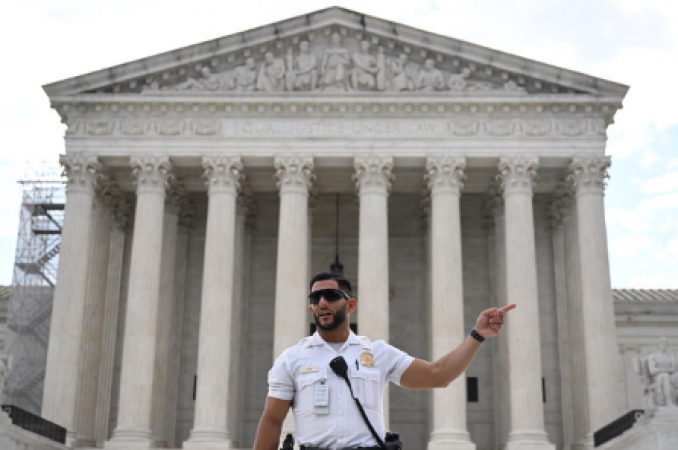
Chicago: There are concerns about how the US Supreme Court's decision on Wednesday to invalidate the long-standing affirmative action laws requiring universities and colleges to give special preferences to certain minorities may affect efforts by Arab Americans to be treated equally.
A majority of the Supreme Court's justices ruled that "race-conscious" admissions policies at Harvard and the University of North Carolina, which gave African Americans and Native Americans easier access to enrollment, were unconstitutional in their ruling on two related legal cases. Only colleges and universities that receive federal funding, which is the majority, are subject to the ruling.
The organisation Students for Fair Admissions brought two lawsuits against Harvard and UNC, claiming that the universities' admissions policies had denied non-Black students the same preferential treatment. The Supreme Court's decision was in response to those lawsuits.
Also Read: Lavrov: Ukraine's Zaporizhzhia Nuclear Plant Engaging in 'Dangerous Game
Community leaders have maintained that the principles of affirmative action serve to pave a path for Arab Americans to overcome anti-Arab discriminatory laws and societal barriers that have prevented them from enjoying the same benefits as other ethnic and racial American minorities, even though Arab Americans are not directly impacted by the ruling because "Arabs" are not mentioned anywhere in the hundreds of pages of the court ruling.
The American Arab Anti-Discrimination Committee's president, Abed Ayoub, said the Supreme Court's decision undermines efforts to promote diversity and racial equality.
"We emphasise that this decision is restricted to just one component of college admissions, in line with our fellow civil rights organisations. It can't and shouldn't interfere with our dedication to inclusion, equity, and diversity, Ayoub said in a statement.
The ADC is devoted to opposing this backwards choice. To break down opportunity barriers and make sure that all people have access to higher education and leadership opportunities, we will keep working with communities of colour and other historically marginalised groups. No less than what our democracy demands.
Ben Crump, a lawyer who has fought for the legal rights of African Americans who have experienced police brutality, spoke as one of the keynote speakers at the organization's most recent convention. Crump embraced Arab Americans, stating that both groups struggle for civil rights.
However, Arabs are not, and have been excluded from the census as an identifiable minority group. While the US government formally recognises Black Americans through the census as "minorities," Arabs are not.
Arab Americans have fought for inclusion for more than 50 years, but it wasn't until recently that they began to feel like they were on the verge of no longer being labelled as "Arabs" but rather as being part of the newer, more inclusive category of "Middle East and North African."
Also Read: Bishop claims that some Britons are only concerned with "brown" immigrants
The Supreme Court's assertion that centuries of institutional and legal discrimination against Black Americans have ended is false, according to Ayoub: Slavery did not end until the 1860s, and several important laws passed in the 1960s recognised Black people's civil rights.
According to him, racism's legacy "continues to stunt the growth of the Arab American community."
Ayoub asserted that Arab Americans have benefited directly and indirectly from affirmative action policies established by the 1965 Civil Rights Act, which the US Supreme Court has since overturned.
According to the ADC statement, it was that bill that eliminated the racist and restrictive immigration restrictions, enabling the longest continuous period of growth of Arab immigrants in this country's history.
Affirmative action has facilitated an atmosphere of respect and understanding between various communities and cultures by enshrining diversity on college campuses. Additionally, it has sparked the development of fresh fields of inquiry and educational initiatives devoted to researching Arab Americans and situating Middle Eastern studies in their historical and contextual contexts.
The principles, according to many conservative organisations, only applied to formally recognised minorities like African Americans and Native Americans and excluded others.
Due to the classification of Arabs as "White" under current US federal laws, they are not eligible for many of the advantages that affirmative action brought, such as recognition as a minority in the US Census and the significant minority business enterprise programmes, which require that at least 30% of government contracts go to businesses owned by African Americans and other minorities.
The decision now gives everyone an equal opportunity to benefit from the American system through merit-based performance, according to Ashley Hayek, executive director of the conservative America First Policy Institute.
Today, the Supreme Court boldly ruled that racial preferences in college admissions are unconstitutional, putting an end to a long-standing injustice. Because of the colour of their skin, our students' future shouldn't be immediately closed off. Affirmative action accomplishes that. Anyone who continues to support it is on the wrong side of history, according to Hayek.
Also Read: Putin claims that desecration of the Qur'an is a crime in Russia while visiting Dagestan
"We cannot stop by only ending racial discrimination on college campuses if we want America to become a merit-based society, as it should. Everywhere else it occurs, especially in hiring practises and DEI (diversity, equality, and inclusion) programmes, it needs to be eliminated. The Supreme Court reiterated that no institution or company is above the law of the land, which is the Constitution and equality for all.